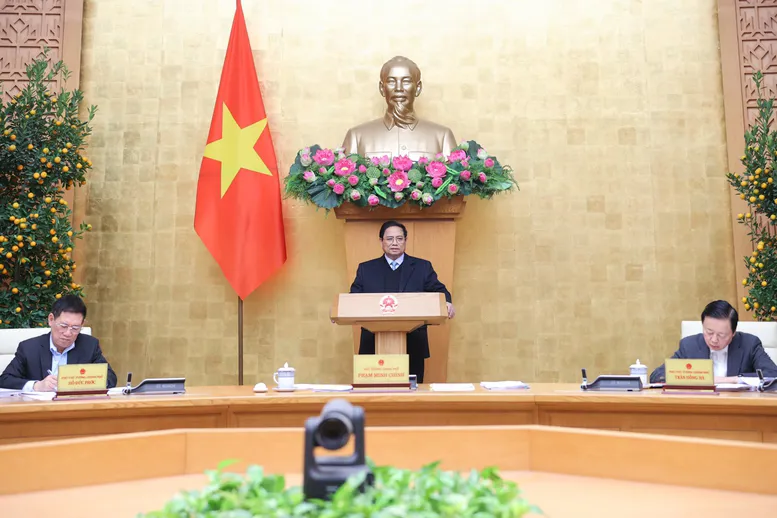Vietnam prepares for potential global trade wars: PM
If such a situation arises, it could disrupt supply chains and shrink Vietnam’s export markets.
Prime Minister Pham Minh Chinh during a Government meeting today [February 5] called for the preparation of scenarios and responses to a potential trade war this year, as global developments continue to unfold rapidly and unpredictably.
| Prime Minister Pham Minh Chinh during the meeting. Photos: Nhat Bac |
Chinh urged government members to thoroughly analyze and forecast new developments, including the possibility of an impending global trade war.
“If such a situation were to happen, it could disrupt supply chains and shrink Vietnam’s export markets,” said Chinh. To avoid missing opportunities and sustain economic growth, he instructed ministries, sectors, and local authorities to propose appropriate response measures.
A report from the Ministry of Planning and Investment also warned of the risks of a new global tariff war, driven by unpredictable policy shifts, particularly in the US, and the reactions of other nations.
The report cited the US decision to impose a 25% tariff on imports from Mexico and Canada and an additional 10% on Chinese goods, effective February 1. However, President Donald Trump later announced a one-month suspension of the tariffs on Mexico and Canada, while the 10% tariff hike on Chinese imports remained in effect, prompting immediate retaliation from Beijing. These developments have heightened tensions in the US-China trade dispute, stated the ministry.
Beyond trade, escalating conflicts in certain regions and ongoing geopolitical instability continue to pose risks. The global economic recovery remains slow and fragile, with major economies cutting interest rates to stimulate growth. These factors affect Vietnam’s economic rebound, especially in exports.
| Cargos at Haiphong port. Photo: The Hanoi Times |
In January, Vietnam’s trade turnover reached over $63 billion, with a trade surplus of $1.23 billion. However, growth prospects remain uncertain due to weak global demand and increasing trade barriers in key export markets, including the US. Protectionist measures and intensifying competition threaten Vietnam’s export sector as well as its domestic market.
For 2025, the government has set a target of at least 8% GDP growth to lay the groundwork for double-digit expansion in subsequent years. To achieve this, the prime minister has called for a revival of traditional growth drivers such as investment, exports, and consumption, while fostering new engines of growth, including the green economy and innovation. Expanding export markets and integrating into global supply chains are also priorities.
The Ministry of Planning and Investment has urged localities and businesses to maximize opportunities from Vietnam’s 17 free trade agreements. The Ministry of Industry and Trade has been tasked with accelerating trade negotiations with Middle Eastern nations, Switzerland, Norway, and Finland to secure new export markets. Additionally, authorities must assist businesses in meeting updated export standards and defending against anti-dumping lawsuits.
Public investment remains a key driver of high economic growth this year and beyond. In January, the disbursement of public capital reached VND35.4 trillion (US$1.4 billion), a 9.6% increase from the same period last year. The planning ministry has proposed expediting disbursements and introducing special mechanisms for large-scale infrastructure projects. Furthermore, the authorities are expected to extend tax and fee exemptions while designing fiscal and credit policies to boost domestic demand and stimulate consumption.
Chinh reaffirmed the goal of completing at least 3,000 kilometers of expressways by 2025. He also emphasized the importance of opening Terminal 3 at Tan Son Nhat International Airport by April 30 and making substantial progress on Phase 1 of Long Thanh International Airport this year. The Minister of Transport has been instructed to report to the government on railway connections with China and address issues related to certain build-operate-transfer (BOT) road projects.
Meanwhile, the Minister of Industry and Trade must submit a report to the government and propose policies to the National Assembly on the development of the Ninh Thuan nuclear power plant. The ministry is also required to finalize regulations on direct power purchase agreements (DPPAs) to improve the electricity market.













